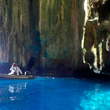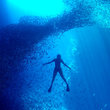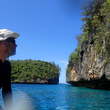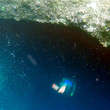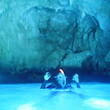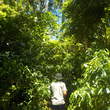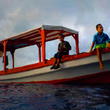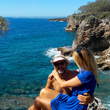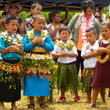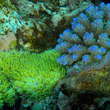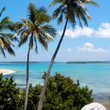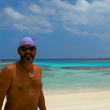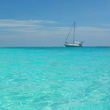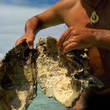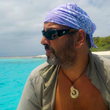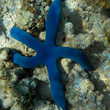This page is an automated translation of /nl/tonga.html and is awaiting a manual review.
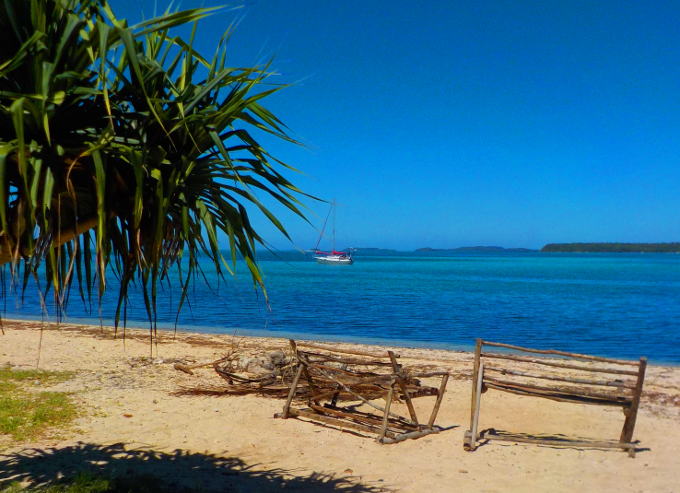
With mixed feelings we leave Niue where we had such a good time. But we have to move on, because the cyclone season is approaching and before this starts we, like all other cruisers, want to reach a safe shelter. For us, that hideout will be New Zealand, a country chosen by most cruisers to sit out the Southern Hemisphere's dangerous summer season. After Niue, Tonga is the most obvious destination before heading to New Zealand. Calling Tonga a "stopover" would do injustice to Tonga: The country has a lot to offer, especially in terms of natural beauty (both under and above water) and of course the now well-known Polynesian friendliness.
On the way to Tonga we don't have to change the clock, but we do have to change the calendar! During the entire journey, we set the clock back an hour every 15 degrees of the globe. If we were to continue sailing to the Netherlands in this way, the time would eventually be correct again because we would have set the clock back an hour 24 times, but the date would no longer be in line. So it has been agreed that approximately when crossing the 180 degree meridian, where the Western Hemisphere merges into the Eastern Hemisphere, the calendar is moved forward one day. About there, because many nearby countries have good reason to stick with the date of a country they have a lot of association with. Niue, where we come from, uses the date of the Cook Islands, but Tonga has chosen to use the date of the Western Fiji Islands, which is also the same date that New Zealand uses. Instead of being 12 hours behind the Netherlands, we are now suddenly 12 hours ahead. So how many days did we cross the crossing? It just depends on how you look at it ...
The crossing to Polynesia is one from a fairytale novel: The entire crossing is half wind of around 15 knots, clear skies and lots of moonlight, calm sea, and so go like a rocket in an extremely comfortable way.
October 3rd in the morning. After the fantastic sailing trip from Niue to Tonga we arrive early in the morning at the Vava'u group in Tonga. The wind has died down in the night and that is a good thing because that way we arrive nicely at the first sunlight. There is not a breath of wind and we sit on the highest part of the cockpit, looking out our eyes. How different than we imagined! We had no image with the Vava'u group and with 'Tonga' we thought of something like San Blas. Vava'u is different! Our peace is disturbed by a fountain of water that suddenly spurts up right in front of our bow. It takes a few seconds to realize that we are colliding with a whale! Unfortunately there is no time to take a picture, we have to swerve lightning fast for this animal that is bigger and heavier than our boat. Fortunately, the whale does his or her best to avoid a collision and disappears gracefully and stately under the water after another short sniff. After this abrupt but brief disturbance of the peace we each go our own way and we sail under a pleasantly roaring engine in otherwise serene peace between the islands. It's a bit like the low fjords of Norway; deep coves and side branches and a completely smooth and bright blue sea in between, where we are now enjoying watching the land from the Omweg. We are also delighted to see that there will certainly be caves here, which requires exploration!
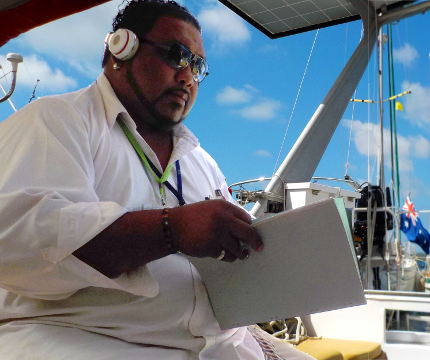
Tonga turns out to be a fantastic destination - it's getting boring! We hate that we have so little time to spare. Not much is relative, we realize that to our shame because we stay there for a month and ehm a month of vacation, we all see in the Netherlands as an unwise long period .... Anyway, it turns out to be much too short to Tonga easy to explore, there are numerous inhabited and uninhabited islands in several groups. Within a group you can sail from one anchorage to another in a very short time (within a few hours). If you want to go to a different group, it is best with a night trip. The groups are very different. We arrive in Vava'u and descend via Ha'apai to Tongatapu.
Tonga is the only country in the Polynesian area that has never been occupied by Europeans. Besides the fact that Tonga is the only Polynesian kingdom, it also has the consequence that there is no (former) occupier who supports Tonga administratively and financially. The latter becomes immediately clear when clearing: It is a mess. The customs clearance procedure seems suspiciously copied from that of New Zealand; we have to moor at the quarantine dock (Q-dock) after which a "health officer" comes on board to check that the boat does not pose a "biological hazard", after which the customs and immigration officials do the further formal handling for her. take into account.
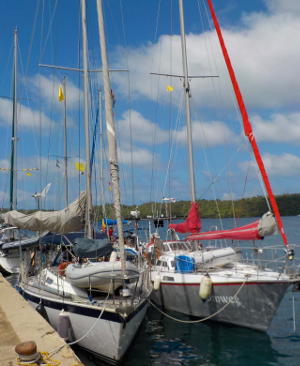
As a cruiser you get used to a few things after a while, but the "health officer" who comes on board ensures that our "smile suppression muscles" receive extra training: the man weighs at least 150 kilos, wears a skirt, wears Dr. Dre headphones and sunglasses which are not removed at any time during the entire performance. We were not quite prepared for the show and have trouble holding back our laughter. Detour leans over when we help this monster on board and after the handling it turns out that we have paid 20 Pangas more than the Tonga government requires and that this cheating "health officer" measures the distance to the boat directly behind us (15 meters). by car instead of on foot. The officer who enters our boat after him is furious when he hears that we have paid 20 Pangas too much, but cannot tell us how we can claim back this excess money.
Another curious fact is that you normally get a visa in Tonga for 30 days, but visitors from Schengen countries get a visa for 90 days. Strange, because Tonga has nothing to do with Schengen or Europe in any way. It irritates the New Zealand visitors who consider this area their backyard that they are only allowed to stay for 30 days while we Europeans from the other side of the world get a standard visa of 90 days. After the curious customs clearance procedure that takes up most of the morning, we are officially in Tonga, at least in this part of Tonga because in every subsequent island group we have to report to a local office again to undergo a shortened customs clearance procedure.
It takes some time, money and effort, but then you also have something. The population is unmistakably Polynesian in descent, because (except for the health officer) friendly, generous and helpful. We do notice that they are more reserved towards others than we were used to in the rest of Polynesia. The country is poorer than the rest of Polynesia and is more reminiscent of the Eastern Caribbean, but here too there are no beggars or people who seem to have difficulty with the somewhat lower prosperity. Also very nice: it is cheap !! The landscape is beautiful, a bit of a cross between the Societies , Niue and the Tuamotu : there are mountains, scattered (un) inhabited atolls with white beaches, volcanoes, caves both above and below water. Whales swim, we see water snakes again and we visit a beautiful reef.
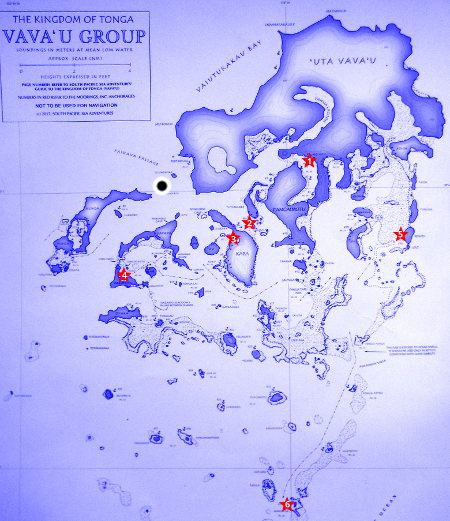
Tonga, Vava'u
Vava'u group
This archipelago is seen as Tonga's cruiser paradise and it is relatively busy. No, not nearly as busy as in the Caribbean but a lot busier than what we've seen in the past six months. But of course that also has to do with the fact that all boats gather here for the crossing to New Zealand. Nevertheless, we also find countless private beaches here where you can anchor and there are even a lot of complete small islands that you can consider all to yourself as long as you anchor there by yourself. Ok, so compared to the Netherlands actually not busy at all; in the Netherlands you would like to have an island like Terschelling all to yourself. We've gotten pretty spoiled in every way, population density, temperature, time; we measure it all against other standards than we ever thought possible in the Netherlands.
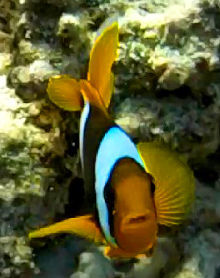
We fell in love with our noses: just after arriving in Tonga, the "blue water festival" starts, a party week for cruisers. Not entirely coincidental of course, because every cruiser knows that the cyclone season is approaching and that you have to get "somewhere in this area now" to find a safe haven from here. That safe haven is in most cases New Zealand and that is why a delegation from New Zealand is present to inform you about the crossing and arrival in New Zealand. Because both in terms of formalities and in terms of weather conditions, the crossing to New Zealand takes quite some effort. We will talk about the details in our next blog, but in order to understand the atmosphere it is good to know that the approaching crossing to New Zealand is quite stirring. The crossing to New Zealand is by far the most complex and exciting part of the entire South Pacific adventure and the lectures organized from New Zealand are therefore readily followed.
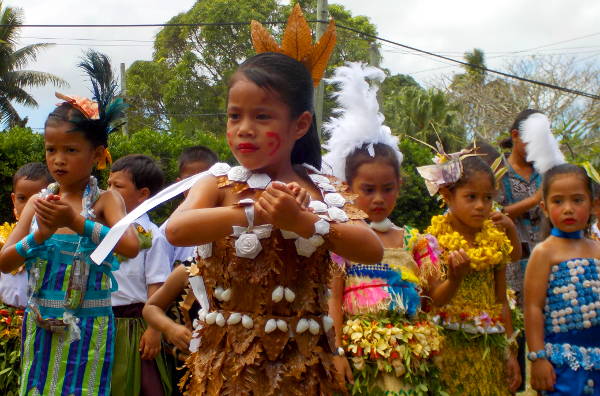
Locals also know that this is the time when the country is frequented by cruisers and creatively organize a fundraising campaign for the school during the blue water festival. Due to a lack of public finances, schools are run by volunteers and the purchase of study materials is therefore dependent on donations. We are invited by the school that lets the children sing and dance in traditional costumes. In between there is a wonderful luxury lunch prepared by the mothers of the school children. Everyone is free to make a small donation and after the festival it appears that enough has been received to be able to purchase the much-needed photocopier. It is to the credit of the people here that they do not hold up their hands but simply organize a valuable day so that it becomes a win-win situation for all involved. The country is not poor because of a lack of effort, but because of tropical cyclones that break down once every few years what has been built up with so much effort. Tropical cyclones use warm seawater as an energy source and the rise in seawater temperature makes it easier for tropical cyclones to form. Five years ago the country was hit hard by a cyclone and its traces are still visible ...
Another part of the "blue water festival" is a sailing race for the cruisers. An unknown enthusiasm among cruisers - who are often ex-racers - flared up.
Now cruisers, even if they are ex-racers, have some unusual handicaps: the boats are overloaded with all supplies and equipment and equipped with braking systems such as solar panels, wind turbines and sun shades, and also suffer from a lack of crew. Most handicaps are inevitable, but there is of course something to do about the lack of crew, and so we, together with Neil and Jeanette from "Echo echo", end up on the sailing boat "Vaguebond" of the Flemish couple An and Ivan. For us it is the first time that we participate in a sailing race and it is actually quite hard work. Normally we do not even think it worthwhile to use more than the standard sailing wardrobe for a four-hour journey, but now we often change sails in a short time and remain almost constantly busy with the sailing. Contrary to usual, the race starts and ends when we leave or arrive at the counter of the cafe, with which we score extra time savings by tearing the dinghy from the briefing to the boat and on arrival just part of the crew (An and Ilona) jump overboard to swim to the cafe. But the effort pays off as we finish first in the "monohull" category. It was a fantastic day on a fantastic boat with a fantastic team. Racing is fun! On the video you only see the moments of rest because nobody had their hands free to film while we were at work.
